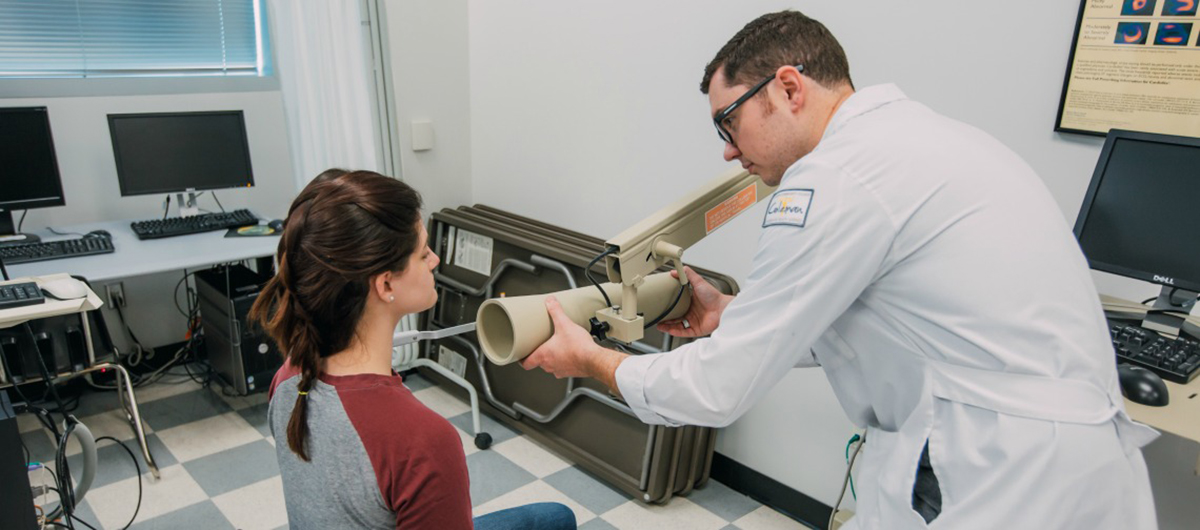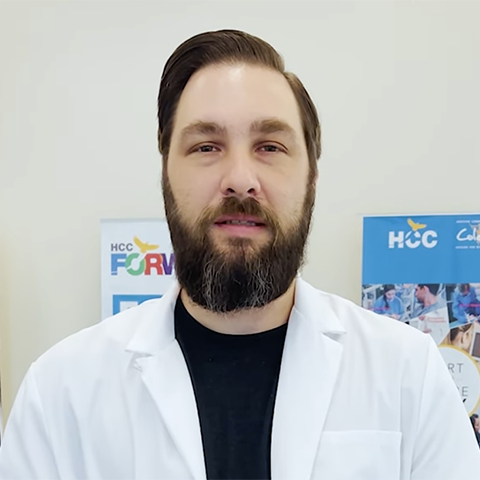Nuclear Medicine Technology

About the Program
A two-year Nuclear Medicine Technology Program student routinely learns the skills needed professionally between 8 a.m. and 4:30 p.m. in both classrooms and in on-site lab settings.
AWARD TYPES: Associate of Applied Science
AREA OF STUDY: Health Sciences
Degrees and Certificates
Learn more about the Degrees and Certificates offered by this program by visiting the HCC Catalog.

Meet Jacob Rickman
Student Testimonial
HCC Coleman College continues to transform the lives of countless students every day. Meet Jacob Rickman, Nuclear Medicine Technology, Class of 2024, and get inspired to start your own rewarding career in healthcare!
Program Student Learning Outcomes
Students will be able to:

Demonstrate competency in patient care.

Demonstrates competency in minimizing radiation exposure. (Radiation Safety)

Demonstrate competency to perform quality control procedures.

Prepare and administer radiopharmaceuticals.

Competently perform imaging and non-imaging nuclear medicine procedures.

Differentiate normal anatomy and pathology on a common nuclear medicine image.
Program Information
A Career in Nuclear Medicine Technology
Nuclear medicine is the medical specialty that utilizes the nuclear properties of radioactive and stable nuclides to make diagnostic evaluations of the physiologic and/or anatomic conditions of the body and to provide therapy with unsealed radioactive sources. The nuclear medicine technologist is an allied health professional who, under the direction of an authorized user, is committed to applying the art and skill of diagnostic evaluation and therapeutics through the safe and effective use of radiopharmaceuticals and pharmaceuticals. The nuclear medicine technologist exhibits professionalism in the performance of duties, demonstrates an empathetic and instructional approach to patient care and maintains confidentiality of information as required. Responsibilities include, but are not limited to: preparation, quality control testing and administration of radioactive compounds; execution of patient imaging procedures including computer processing and image enhancement; laboratory testing; patient interviews; instruction and preparation for administration of prescribed radioactive compounds for therapy; quality control; and radiation safety. The nuclear medicine technologist applies knowledge of radiation physics and safety regulations to limit radiation exposure of the general public, patients, fellow workers, and self to as low as reasonably achievable (ALARA). Professional growth and development is achieved through appropriate utilization of new technologies, participation in continuing education and involvement in research to enhance the quality of patient care.
A Nuclear Medicine Technologist, whose career requires the specialist to stand for long periods, is routinely transferring patients from wheelchairs and stretchers to scanning tables, giving injections and taking vital signs with or without accommodation. A Nuclear Medicine Technologist finds employment in hospitals and diagnostic clinics. Career ladders are open for advancement into research, sales, education and management.
With further training, a Nuclear Medicine Technologist could perform computed tomography (CT) imaging, magnetic resonance imaging (MRI), diagnostic medical sonography, or radiation therapy. According to the US Bureau of Labor Statistics the average salary for an entry-level Nuclear medicine Technologist in May 2022.
was 43.03 - median 89,610 - Annual Median.
Accreditation Information
Graduate achievement data is an indicator of program effectiveness, demonstrating the extent to which a program achieves its goals. The current report on graduate achievement data, identified by program, is available on the JRCNMT website by clicking on the following link:
Graduate Achievement Data | JRCNMT
Job Placement. Job placement indicates graduate employment status at six months post-graduation from a nuclear medicine technology program. The percentage on the data table is the percentage of total graduates that are working as a nuclear medicine technologist, diagnostic CT technologist or technologist working in both imaging areas in a full-time, part-time or per-diem position at six months.
Licensure/Certification Exam Results
2022-2023 Third-Party Licensure/Certification Exam Results
Occupational licensure and/or certification pass rates reported by calendar year (Jan. 1 – Dec. 31). Results for the 2018, 2019, 2020, and 2021 calendar years are provided for comparison.
|
Program/Aligned Award |
Agency Standard |
HCC Standard |
2018 Pass Rate (# Passed) |
2019 Pass Rate (# Passed) |
2020 Pass Rate (# Passed) |
2021 Pass Rate (# Passed) |
2022 Pass Rate (# Passed) |
2023 Pass Rate (#Passed) |
Results |
|---|---|---|---|---|---|---|---|---|---|
|
Nuclear Medicine Technology: Nuclear Medicine Technology Certification Board (AAS) |
80% |
80% |
100% (26) |
92% (24) |
81% (25) |
87% (13) |
81% (17) |
89% (16) |
Above Expectations |
|
Nuclear Medicine Technology: American Registry of Radiologic Technologists (AAS) |
80% |
80% |
100% (24) |
100% (25) |
82% (22) |
82% (14) |
95% (21) |
89% (16) |
Above Expectations |
Texas Education Association (TEA) Industry Based Certification Resource
| Certification Name | TEA Resource Link | Third-Party Certification Agency | Third-Party Certification Agency Website |
|---|---|---|---|
|
Nuclear Medical Technology/ |
https://tea.texas.gov/sites/ |
Nuclear Medicine Technology Certification Board (NMTCB) | https://www.nmtcb.org/ |
| Certification Name | TEA Resource Link | Third-Party Certification Agency | Third-Party Certification Agency Website |
|---|---|---|---|
|
Nuclear Medical Technology/ |
https://tea.texas.gov/sites/ |
American Registry of Radiologic Technologists (ARRT) | https://www.arrt.org/about/about-us |
Marketable Skills
Learn more about the marketable skills—skills valued by employers that can be applied in variety of work settings—so you can communicate these to potential employers. Click on the relevant award title below to see descriptions of marketable skills for that area.
Ready to apply? OK, let's start!
Applications for this program are accepted during the window listed in the Admissions Guide, and application evaluations will begin once the window closes. All admissions communications will be sent to your personal and HCC email, so please check them regularly.
1. Complete an information session
Learn more about the Nuclear Medicine Technology Program by completing an online information session.
The Information Session will be held in person and virtually for each date listed. The benefit of attending in-person is that you will get to tour the Nuclear Medicine Technology Lab and Coleman College for Health Science. The Program Director of Nuclear Medicine Technology will give an information session and answer questions.
2. Review the admissions guide
Please review the admissions guide for the desired program:
3. Are you a current/former HCC student?
If you are currently/formerly a registered HCC student with a valid student ID number and preferred email address, please proceed to step 4.
If you do not yet have an HCC student ID number, please apply for HCC at applytexas.org
4. Apply to the program.
View and fill out the important documents below:
Click on the link below to submit your online application.
Resources
Search for a Nuclear Medicine Technology Professor or request more information
Get in touch
Nuclear Medicine Technology
Vikki Davis-Littleton
vikki.davislittleton@hccs.edu
